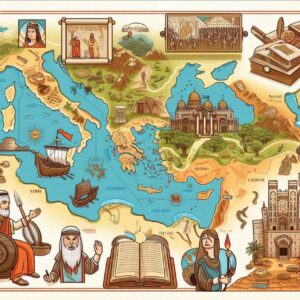Welcome Blessings!
(Tap 🔽 to see more topics!)


Have you ever opened the Bible, read a verse, and felt completely lost? Many people struggle to understand the deeper meanings of biblical passages. Sometimes, the words seem contradictory, outdated, or just plain confusing. But what if I told you that unlocking the Bible’s wisdom is easier than you think?
Imagine putting together a puzzle without looking at the picture on the box. You might get a few pieces right, but it’s easy to misplace some without seeing the bigger picture. The same goes for reading the Bible. If we don’t understand historical, literary, theological, and personal context, we might misinterpret what God is trying to tell us. So, how can we truly understand the Bible’s secrets? Let’s uncover the key principles that can transform how you read and interpret Scripture.
Context is everything. Without it, we risk misinterpreting verses, creating confusion, and even leading ourselves away from the truth. To fully grasp the Bible’s messages, we need to consider four key types of context:
1. Historical Context
Understanding the Time and Culture
Have you ever watched a period drama and realized people spoke, dressed, and behaved differently from today? The Bible was written thousands of years ago, and understanding its historical background helps us understand why certain things were written the way they were.
Historical context is information about the time and place of the writing and the events and culture of the people involved. It helps us understand the original setting and situation of the Bible verses and how they relate to the larger story of God’s plan and purpose for His people.
For example, knowing that Jesus lived under Roman rule explains why many of His teachings contrasted with the harsh laws of that time. Understanding Jewish customs also illuminates Jesus’ parables and miracles.
Questions to ask:

2. Literary Context
Recognizing Different Writing Styles
Would you interpret a poem the same way you interpret a legal document? Probably not. The Bible comprises different genres—history, poetry, prophecy, wisdom literature, and epistles.
Literary context is the information about the genre and structure of the writing and the literary devices and techniques used by the author. This context helps us understand the style and purpose of the Bible verses and how they fit into the overall message and theme of the book or section.
For example, the Psalms are poetic and filled with metaphors, while the Gospels are biographical accounts of Jesus’ life. Mixing up genres can lead to misunderstandings.
Questions to ask:
3. Theological Context
Aligning with God’s Truth
The Bible is a story about God’s relationship with humanity. Interpreting verses that align with the Bible’s overall message—God’s love, justice, and plan for salvation—is essential.
What is it? Theological context is information about the beliefs and teachings of the author and the audience and how they relate to God’s revelation and will. It will aid us in understanding the meaning and significance of the Bible verses and how they reveal God’s character and actions.
For example, if a verse contradicts another passage, looking at the overarching themes in Scripture is helpful. Does it align with God’s character? If not, it may be taken out of context.
Questions to ask:
4. Personal Context
Applying Scripture to Your Life
Finally, the Bible isn’t just an ancient book—it’s God’s message to you today. But our personal experiences, biases, and emotions can sometimes cloud our understanding. Personal context is information about our situation and perspective and how they influence our interpretation and application of the Bible verses. Unique context guides us in comprehending our biases and assumptions and how they affect our understanding and response to God’s Word.
For instance, someone going through hardship might read Psalm 23 (“The Lord is my shepherd”) and find comfort, while someone distant from God might read it differently.
Questions to ask:
These questions will enable us to understand the Bible’s secrets. We can also avoid common pitfalls and errors that distort or misinterpret God’s Word.

Misinterpretation happens when we fail to consider context. Some common pitfalls are the following:
When understanding the Bible’s secrets, we should avoid these common pitfalls and errors. They can lead us to misinterpret or misuse God’s Word and miss out on its real message and application.
Understanding the Bible isn’t just about knowledge but spiritual growth. Here’s how you can make your Bible study more effective:

The Bible isn’t just a book. It’s a living message from God to us. But to unlock its secrets, we must read it in context. Understanding its historical, literary, theological, and personal aspects allows us to uncover its deeper truths and apply them to our lives. Next time you open your Bible, approach it with curiosity and an open heart. Ask the right questions, avoid common mistakes, and, most importantly, invite God into the process. His Word can transform, guide, and inspire if we seek to understand it correctly. Are you ready to unlock the Bible’s secrets?
We have a budding YouTube channel, Light Up Your Journey, that you would love to join. You can discover Bible verses or Scripture videos that will help boost your mood and inspire you. Remember, the best way to find inspiration is to seek it out. We appreciate you joining us today! Voila! Until next time!